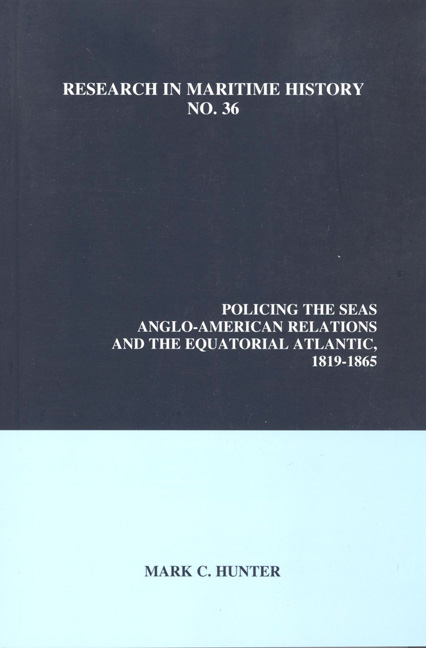Book contents
- Frontmatter
- Contents
- List of Tables
- List of Illustrations
- About the Author
- Acknowledgements
- Chapter 1 Introduction
- Chapter 2 The Atlantic
- Chapter 3 Anglo-American Policymaking, 1819-1834
- Chapter 4 Naval Relations and the Suppression of Piracy and Slaving, 1820-1830
- Chapter 5 A Naval Compromise, 1830-1842
- Chapter 6 The Royal Navy and West Africa, 1843-1857
- Chapter 7 The US Navy and West Africa, 1843-1857
- Chapter 8 Conflict Avoidance in the Equatorial Atlantic
- Chapter 9 The Civil War and Conflict Resolution in the Equatorial Atlantic
- Select Bibliography
Chapter 8 - Conflict Avoidance in the Equatorial Atlantic
- Frontmatter
- Contents
- List of Tables
- List of Illustrations
- About the Author
- Acknowledgements
- Chapter 1 Introduction
- Chapter 2 The Atlantic
- Chapter 3 Anglo-American Policymaking, 1819-1834
- Chapter 4 Naval Relations and the Suppression of Piracy and Slaving, 1820-1830
- Chapter 5 A Naval Compromise, 1830-1842
- Chapter 6 The Royal Navy and West Africa, 1843-1857
- Chapter 7 The US Navy and West Africa, 1843-1857
- Chapter 8 Conflict Avoidance in the Equatorial Atlantic
- Chapter 9 The Civil War and Conflict Resolution in the Equatorial Atlantic
- Select Bibliography
Summary
Britain and America deployed naval forces to the West African coast, but divergent policies often generated tension. Britain combined slave-trade suppression with economic and strategic policies, while the US kept slave-trade suppression and commerce protection separate. The contrasting polices led to conflict as continued US involvement in the slave trade threatened British goals, and Americans feared that London mean to dominate African trade. But the role of sea power in furthering long-term goals peacefully provided a mechanism through which Britain and the US could prevent tensions from going too far. In short, sea power provided a safety valve that they adjusted to preserve relations, the balance of power and commercial endeavours.
Several interrelated cases in the equatorial Atlantic illustrate how Britain and America dissipated tension by controlling their use of sea power. To reduce the chances of conflict, they focused most of their slave-trade suppression on the West African coast, away from sensitive commercial traffic in the western equatorial Atlantic. They tried to cooperate by sharing intelligence rather than by undertaking questionable searches of vessels flying dubious flags. Moreover, when conflict arose, both remained calm and censured overzealous naval officers. Such sensitivity was particularly important in the western equatorial Atlantic, where US interests in connecting its east and west coasts through the Central American isthmus were paramount.
Close to home waters Americans saw little difference in the Royal Navy (RN) searching US-flagged ships for slavers or filibusters, private citizens waging an expansive war against Cuba and Central America. Rather than risk war, London acquiesced to American sensitivities and modified its naval policy accordingly. Rather than continue forceful actions against the slave trade that might drive places like Cuba into US hands, the RN patrolled for filibusters, while Britain reined in naval officers and disavowed the forceful actions of British representatives. The government would not let Northern abolitionists drag the country into war over slave-trade suppression close to American waters. London showed restraint, while for the sake of peaceful coexistence Washington eventually condemned filibuster activities and dispatched the United States Navy (USN) to stop them. By 1859, under continued British and domestic pressure, the US deployed a steamer force to patrol Cuba for filibusters and slavers and to protect its interests; another force would do the same off West Africa.
- Type
- Chapter
- Information
- Policing the SeasAnglo-American Relations and the Equatorial Atlantic, 1819-1865, pp. 197 - 226Publisher: Liverpool University PressPrint publication year: 2008



